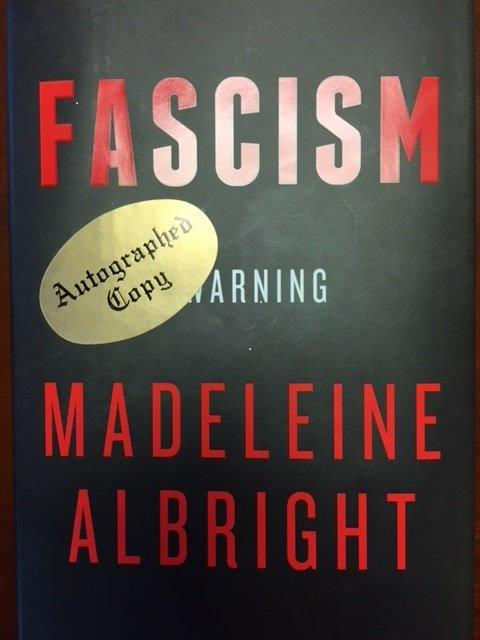BOOK REVIEW: Fascism: A Warning by Madeleine Albright
- Bill Howard
- May 15, 2018
- 3 min read

Fascism: A Warning by Madeleine Albright (with Bob Woodward) New York: HarperCollins Publishers, 2018. $27.99 288pp.
Fascism: A Warning is the latest book by former U.S. Secretary of State Madeleine Albright. Albright writes that while she never thought she would author another book after the publication of her memoirs in 2003, she had been pondering writing a book on fascism prior to the 2016 presidential election.
Secretary Albright is well-positioned to provide both history and opinion in this study which seems to have emanated from discussions with graduate students in her international relations courses at Georgetown University. In this book, Albright traces the history of Fascism focusing on the personalities that populate the Fascist chronology, as well as the factors that marked the rise of Fascist ideologies. In this work, Secretary Albright observes that there are common themes.
Most tellingly, Albright writes that Fascism is not something that emerges suddenly and without provocation. In virtually every instance highlighted here, Fascism was a gradual erosion of values – a collection of small things that accumulated over time. She writes: “It is worth remembering, too, that Fascism rarely makes a dramatic entrance. Typically, it begins with a seemingly minor character – Mussolini in a crowded cellar, Hitler on a street corner – who step forward only as dramatic events unfold. The story advances when the opportunity to act comes and Fascists alone are prepared to strike. That is when small aggressions, if unopposed, grow into larger ones, when what was objectionable is accepted, and when contrarian voices are drowned out.”
The cast of historical characters in this discussion are mostly familiar, but Secretary Albright extends the discussion to more recent times and updates her analysis to include events in Putin’s Russia and Kim Jong-un’s North Korea. While her account of North Korea is informative, events are unfolding so rapidly there that many of her observations are already dated.
It’s clear that Secretary Albright has concerns about the current White House administration as well as the political engagement of the American electorate. She remains unsure of whether the tendencies expressed by the current president are part of the flow of Fascism or mere political stagecraft. Only time will tell. The book is not overtly political, however, and this book is more about the troubling spectra of Fascism and a warning of its creeping rise than some anti-Trump diatribe. There are some interesting historical tidbits sprinkled throughout its pages.
I was unaware that Vladimir Putin’s grandfather served as Stalin’s chef and what Putin’s family endured during the Stalingrad siege and after. Such understanding of personal history can often provide insight. Likewise, I found it stunning that at a time when President Trump and his supporters chant “Drain the Swamp”, the Italian leader Benito Mussolini used the same catch phrase in his campaign to drenare la palude (drain the swamp) in terminating 35,000 civil servants. Lastly, Secretary Albright’s visit to North Korea found Kim Jong-il engaging and pragmatic and among the few world leaders that Albright met during her tenure who seemed to listen more than lecture Albright.
Fascism: A Warning is a fast-paced narrative. In chronicling history and the rise of Fascist leaders, it is also a call for action in opposition and recognition of those tendencies that compromise democracy. Rendered a citizen of the world. Initially by the circumstances of war, and then by her positions in government, Secretary Albright has published a message of both admiration of the country she calls home and a warning for all who value America’s place as the standard bearer of democracy.




Comments